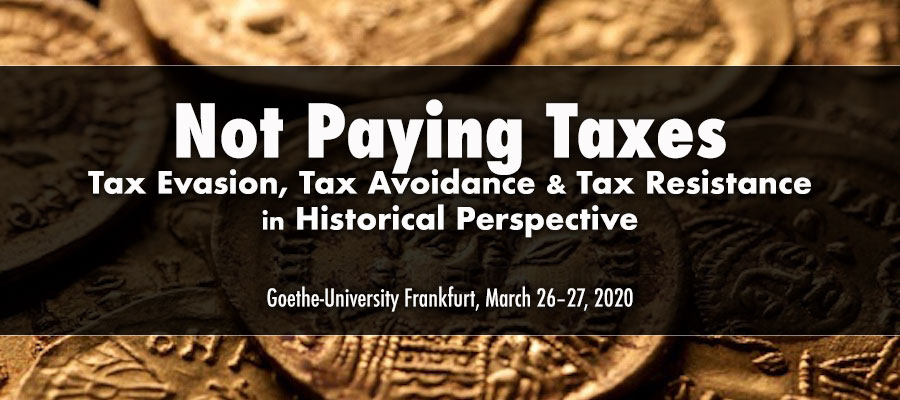Not Paying Taxes: Tax Evasion, Tax Avoidance and Tax Resistance in Historical Perspective, Goethe-University Frankfurt, March 26–27, 2020
States have always relied on their subjects’ or citizens’ mandatory contributions to cover the costs of public expenditures. Besides warlike occupation and exploitation, such duties, fees or taxes were often regulated by law, similar forms of binding norms and rules, or social pressure.
At the same time, tacit refusal or open resistance to paying public charges can be observed in different periods of history, types of societies, political formations and places, sometimes even leading to revolutionary transformation. The aim of our cross-epochal and interdisciplinary workshop is not, however, a history of revolutions starting from tax revolts. Rather, we want to examine the different practices and forms of withholding and avoiding personal and financial duties, fees and taxes over time and among different social, professional and other groups. This includes, on the one hand, open and organized tax resistance on moral, economic and political grounds, challenging the existing legal or political order and claiming more or a different form of tax justice and redistribution, or a modification of how taxes are collected. In these cases, personal or financial duties were often seen as a form of humiliation and a marker of subordinated status. On the other hand, taxes and duties were often not resisted publically but rather avoided or evaded in secret. These terms refer to notions that distinguish between legal practices of lowering the intended burden and thus saving taxes or fees, and maneuvers that were classified as illegal or criminal. Such categorizations, though, depend on changing moral and legal perceptions and/or on class-related negotiating power.
Our workshop is interested in all forms of and motives for not paying public fees and taxes. Possible topics for presentations could be:
- Practices of how taxes were resisted, refused, avoided or evaded in the past
- A socio-demographic analysis of tax resisters and avoiders according to gender, social, household, age, professional, religious, ethnic etc. groups and classes
- Strategies to justify saving/avoiding/evading or publically resisting fees and taxes
- Conflicts between payers and administrators due to the said practices
- Consequences of the discovery of saving practices (e.g. tax loopholes) for legislation as well as economic consequences of avoidance or resistance
- Public reactions and scandalizing (media, partisan politics etc.)
- Scientific approaches to examine, measure or prevent tax-saving practices
Proposals also from ancient, medieval, early modern, modern and non-European history are highly welcome, as are contributions from the history of law, of science and philosophy and of political and economic thought, from historical sociology and political economy.
